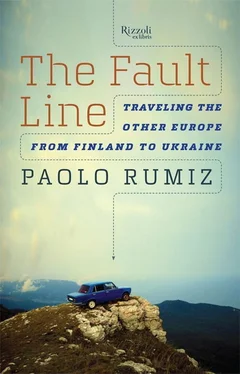The city is spotless. In front of every front door, there is someone sweeping and washing the sidewalk. At every intersection, there is a sign that says THIS IS OUR CITY. A healthy dose of local patriotism. In Sobor (Cathedral) Square, outdoor tables and chess games. Hundreds of simultaneous challenges. Monika tells me that chess is an Orthodox art form. The Poles don’t play. On the iron grating of the Iskusstv Bridge (Bridge of the Arts), above the commercial port (overlooking tugboats, ferries, and mountains of coal), dozens of shining closed padlocks with the names of lovers written on them: Masa and Vadiki; Dunya and Lepa; Valzer and Nasta. Igor and Oksana have hung a whole chain of them and thrown the keys in the water. It’s hard to resist the temptation to let this be the end of the journey rather than Istanbul.
On the propylaea of the Vorontsov Palace, not far from the stairway made famous by the film Battleship Potemkin , two women friends are looking out at the sea and talking. One looks to be seventy-five, the other twenty years younger.
Monika strikes up a conversation about the beauty of the city.
The older woman responds: “Beautiful but full of thieves. They steal the old houses to build new ones.”
Did they steal your house, too?
“They won’t be able to until they’ve finished down below… in the catacombs. …From my house I can see the water. I’ve got a terrace with a grapevine. I’ll never give it up. I used to watch my husband going out to sea from up there. He was a sailor.”
On the Black Sea?
“Yes, on the Black Sea. I didn’t used to believe it, but it really is black. I realized it when I went on a voyage with him. But if the wind comes down from Siberia, the black turns green, with whitecaps.”
The colonnade is inflamed by the sunset, a rugby-ball-shaped moon is rising, and, carried on the air from some unseen location, we hear the notes of “Blue Moon.” The younger of the two women talks about her friends who have emigrated to the West.
“Those who have left here are full of regrets. Even our friend Valentina. We all lived together, helped each other, cooked blini together. Ah, how we love blini; when I cook them, I don’t need to buy anything else.”
The older woman: “For tonight I’ve cooked potatoes under the embers. I’ll put a little oil on them. Then I’ll go out for a walk. Sometimes I walk until two or three o’clock in the morning. Odessa lives by night. You meet people who have come from Russia, Moldova, Belarus. They’re not rich. Ordinary people, factory workers even.”
Just a few hours left before our departure for Istanbul. A lump in my throat. Leaving behind the Slavic world hurts.
I see it and say, “That can’t be it.”
The ferry that’s going to take us to Istanbul can’t even remotely resemble the rust bucket that appears at the bottom of the Potemkin Stairs, on the left side of the Odessa Marine Station. It’s so short that it looks like a Venetian water bus, so low that only the smokestack is higher than the upper terrace of the terminal, so anti-aerodynamic that it seems to belong to another era. The inside can hold no more than five or six trucks and thirty or so automobiles. I say to myself, The farthest this thing can go is to Crimea, around the corner from here .
But no, this is our ship all right. The letters UKR FERRY on the side erase all doubts. The line for passenger tickets and the one on the ramp for the vehicle deck are both following the sign for Istanbul. Only the name— Caledonia —seems to belong to other seas and other latitudes. Who in the world travels from Odessa to the Bosporus? I asked myself that question many times when I was trying to reserve two places for that out-of-the-way crossing. Now I see them, the passengers with whom I’ll be bringing to a close my vertical European trip. They come from another world.
Agatha Christie characters: an Ethiopian on foot with an American passport and full of rings and trinkets. A sort of New-Age shaman with a contemptuous look and turbid eyes, a backpack, and a colorful floor-length gown. Two jolly jelly bellies from Kiev aboard a metallic gray Jeep with a space-age trailer of the same color. An Armenian truck driver in clogs and a muscle shirt, dark and sharp-featured the way only an Armenian can be. Three young Muscovite centaurs on their way to Greece with expensive leather biker outfits and American motorcycles. Two Moldovian models who pose for photographs as they whimper and moan, sitting on their suitcases. A little girl in an orange dress, whose long skirt billows in the wind like a hot air balloon. The Black Sea grabs us in its tentacles like a jellyfish, and at the first sign of rain, it turns really black, black as coal. Up to a minute ago, it had been windy and greenish blue. Now it is still, oily, and dark, and I finally understand where it got its name. In an instant Odessa disappears behind the mist, and only the colonnade of Vorontsov Palace, above the port, keeps shining for a few minutes, the Nordic propylaea illuminated by a solitary ray of sunlight. The sharpness of the image is absolute. It even seems to me that I can make out the two women whom we met the night before. After that, it’s all a soporific pitch and roll. Nothing worth staying on deck for.
Vroom-vroom toward the Bosporus. Four hundred miles nonstop, without a view of the Danube Delta nor even of the coastal hills of Dobruja. Almost a flight, like that of Jason from Colchis. Now it’s pouring rain, my travel companion has taken to her cabin to correct the proofs of her book Boży ludzie , God’s People, depicting the religious of the Other Europe. The dining rooms are empty; everyone is already asleep in the cabins, even the three Russian bikers and the Ethiopian shaman with the U.S. passport. I stay on at the aft disco bar to play cards with a Bulgarian, and he immediately places on the table a small icon of Saint Nicholas, which opens like a book, so that the bearded protector of sailors stands up and I can keep an eye on him, a good-luck charm against storms.
The first boat on this journey—the fishing boat specialized in giant crabs from Kamchatka encountered on the Russian-Norwegian frontier—had an icon on deck of good ol’ Saint Nick. I have the impression that he’s been with me the whole time on this Slavic journey accompanied by bodies of water, even on dry land, between one lake and another, one river and the next, like the Viking ships that made it to Kiev from the Baltic or like the boat of Väinämöinen, the shipwright bard of Finnic legend, carried on his back amid the birch trees of Karelia.
The next day, in the few hours that we’re on board, a lot of things happen. Everyone knows that a ship is an extraterritorial space, where the rules that apply on land are no longer valid. The Bulgarian challenges a Russian to a chess match, and after a well-mannered confrontation that goes on for hours, the two almost get into a fistfight. In the disco bar, on the other hand, a stormy love story is born between a pallid Caucasian (Circassian) woman and a blue-eyed Turk, and the whole ship seems to have been sucked into that clandestine tryst, which the protagonists do nothing to hide. A Ukrainian from Podolia recounts the Gulag epic of his parents. I feel I’m a hundred thousand versts from Odessa. Lost in space.
I take inventory of my personal belongings and discover that the contents of my backpack have changed. There is a new equilibrium between things given and things received. I no longer have my knife, some drawing books, the mosquito net, colored pens, or a book on the White Sea purchased in Murmansk. Instead I have the book on Nordic sagas I received as a present from the wolf-man on the shores of Lake Onega. A necklace from Shungut. The crest of the Russian Boy Scouts, attached to my buttonhole by a soldier in the house of a pope. A box of old coins received from a Lithuanian hitchhiker who works as a joiner.
Читать дальше












